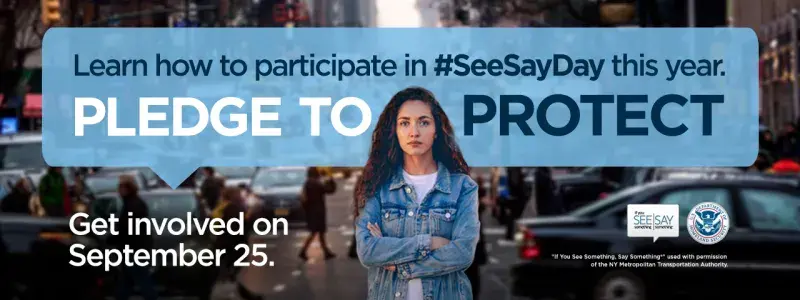
Speak Up: Take the Pledge to Protect Your Community This #SeeSayDay
Our nation remains in a heightened threat environment. We all have someone, or something, to protect. The best way to keep our communities safe and prepared can be summarized in a single message: “If You See Something, Say Something®.”
The U.S. Department of Homeland Security’s (DHS) "If You See Something, Say Something®" campaign works throughout the year to empower and educate the public about the importance of recognizing and reporting terrorism-related suspicious activity to local authorities.
September 25 is National “If You See Something, Say Something®” Awareness Day, also known as #SeeSayDay. On this day, DHS, its partners, and the public come together to recognize our shared responsibility to keep our communities safe.
How to Participate in #SeeSayDay on September 25, 2023
This year, the campaign is asking everyone to pledge to protect their communities by reporting terrorism-related suspicious activity to local authorities.
Here is how you can take the #SeeSayDay pledge:
- Learn and be aware of the warning signs and threats.*
- Immediately speak up and report suspicious activity to local authorities.
- On September 25, 2023, use the campaign’s #SeeSayDay hashtag and #SeeSayDay graphics on your social media accounts to share your “pledge to protect.”
Don’t be a bystander to suspicious activity. This #SeeSayDay, pledge to protect your community.
Check out DHS.gov/SeeSay for more information about the campaign and resources to share with your network.
*Remember: Factors such as race, ethnicity, gender, national origin, disability, religion, sexual orientation, or gender identity are not indicators of suspicious activity. A cornerstone of the DHS mission is ensuring that people’s civil liberties are not diminished by our security efforts, activities, and programs. As such, the DHS “If You See Something, Say Something®” campaign encourages the public to report only suspicious behavior and situations (e.g., someone breaking into a restricted area), rather than one’s appearance, to authorities.
